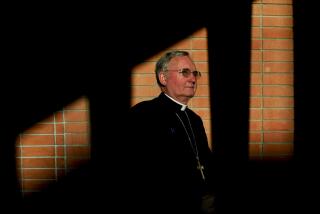Episcopal Bishop Has Peacemaker Role Amid Tensions : Leadership: Edmond L. Browning seeks to promote communication in the church, which is debating several controversial topics. Some critics say he isn’t enough of a crusader.
- Share via
NEW YORK — Soon after Edmond L. Browning was installed in 1986 as presiding bishop of the Episcopal Church, he got a letter from a young woman, a social activist in the church.
The woman expressed frustration with the church, which she viewed as too passive in the social arena. She told Browning her letter had been prompted by her observations of him during a program in Pittsburgh.
“I was instantly disappointed,” she said of the encounter. “I guess I had expected to see a warrior . . . a figure who would demand attention,” who would “lead the church to a higher ground.”
But as the day wore on, the “small, unassuming man dressed in black” won her allegiance by his capacity to listen, his apparent concern and his straightforward speaking style. By the end of the day, she wrote Browning, her faith in the church was renewed.
In the midst of tensions marking the era in which Browning was elected to serve, his supporters say the qualities the young woman cited have been well suited. It is no secret that those tensions--set in the context of membership losses and dwindling resources in many mainline churches--are mounting as the 2.9-million-member denomination approaches its 1991 General Convention this month.
High among the conflicts, sure to be grist for convention debates, is the volatile matter of whether homosexuals should serve as priests.
Browning said he sees the role of presiding bishop as standing above the fray, promoting dialogue and healing. That administrative style has led critics on the right and left to complain that he is too much the peacemaker and too little the crusader.
“Some people feel he makes too many efforts to reach out” to those who disagree with him or with each other, said Bishop Frederick H. Borsch of Los Angeles.
But Browning--the bishop who said at his installation that there should be “no outcasts” in the church--said his propensity to avoid sides in intra-church disputes is a product of decision, not its opposite.
It was obvious recently to both his admirers and his critics that the peacemaker became crusader and newsmaker when peace itself was at stake.
As head of the denomination to which President Bush and Secretary of State James Baker belong, Browning quickly emerged during the Persian Gulf crisis as spokesman for liberal Protestants who opposed use of military force in ousting Iraq from Kuwait.
In another controversial move, Browning determined last November that the church would go forward with plans to hold its General Convention in Phoenix, despite a refusal by Arizona voters to designate Martin Luther King Jr.’s birthday a state holiday.
Rather than pull out, the church would use the convention as a forum for promoting racial equality, Browning said.
The strong social concerns rankle conservatives, who contend that Browning puts too much stress on such issues.
Lawrence Adams, director of the conservative Episcopal Committee on Religion and Freedom, an arm of the Institute for Freedom and Democracy in Washington, complains that Browning has “politicized” his office by such actions as his highly public position on the war.
Although he was the target of considerable criticism for his opposition to the war, Browning said he never doubted his decision to speak out.
“I experienced some of the deepest gloom of my life during the war,” he said. “I don’t think anything was really accomplished. The war intensified problems that already existed in the Middle East. It has created tremendously inhumane conditions in Iraq.”
On sensitive church matters, Browning is less forthright in these tense times. Although he said in 1986 that he disagreed with a stand the church took in 1979 against ordaining homosexuals, he is acutely aware of the deep rift in the church on the issue and prefers to focus on his role as mediator.
Against the backdrop of the convention, the Rev. Elizabeth L. Carl, who speaks openly about her lesbian relationship, was ordained an Episcopal priest recently in Washington, D.C.
The convention will consider a proposal to leave decisions about ordaining homosexuals in the hands of individual dioceses. Browning thinks the timing of Carl’s ordination was needlessly provocative, serving to galvanize opposition.
“I really do have a sense that the church hasn’t wrestled with this issue as deeply as it might,” he said. “The 1988 convention called upon every parish and diocese to do study and reflection. I don’t think that has happened, because people don’t want to do it.”
More to Read
Sign up for Essential California
The most important California stories and recommendations in your inbox every morning.
You may occasionally receive promotional content from the Los Angeles Times.










